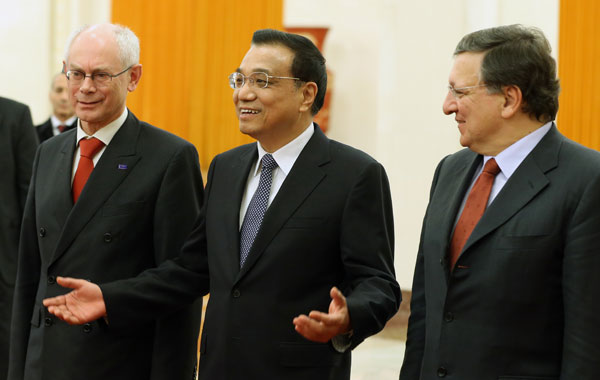Talks begin on an investment protocol; 2020 trade target set at $1 trillion
|
 |
|
Premier Li Keqiang meets European Council President Herman Van Rompuy (left) and European Commission President Jose Manuel Barroso in the Great Hall of the People in Beijing on Thursday. They attended the 16th China-EU leaders' meeting, which worked out a blueprint for bilateral relations in coming years. Wu Zhiyi / China Daily |
China and the European Union announced a grand plan for cooperation until 2020 on Thursday and started talks on an investment protocol, mapping out the blueprint for the key relationship in coming years.
They also vowed to discuss the feasibility of a free trade agreement and set the target for bilateral trade volume in 2020 at $1 trillion, nearly doubling the $546 billion recorded in 2012.
The decision was made at the EU's first summit with China's new leadership, nearly a week after China announced a plan for sweeping reforms for the next decade.
Observers said it is a historic moment for China's relations with the EU as both have decided to combine their targets.
Premier Li Keqiang said of the China-EU 2020 Strategic Agenda, "The plan is unprecedented in its breadth of content, ranging from aerospace and counter-piracy to urbanization and energy."
He made the remarks at a joint briefing also attended by European Council President Herman Van Rompuy and European Commission President Jose Manuel Barroso after their 90-minute talks at the 16th China-EU leaders' meeting.
At the start of the meeting, Li said he hoped that results can be achieved in the investment protocol talks.
Van Rompuy told reporters that the two sides have made "a substantial step forward today by launching negotiations on an investment agreement, covering both investment protection and market access".
"Our strategies need to be intertwined for the upcoming years to 2020 and beyond," he said, adding that an investment agreement can help avoid protectionism and promote investment, while assuring a level playing field.
"Our summit today has been an important building block in the EU-China relationship," he said.
Shada Islam, director of Policy Friends of Europe, a nonprofit think tank for EU policy analysis and debate, told China Daily the EU-China Summit "offers a much-needed moment of reflection and respite".
Islam said the summit comes after a fraught year marked by tense exchanges over trade, and reciprocal accusations of arrogance, indifference and neglect.
"China's newly announced reform strategies are conducive to a more constructive EU-China economic relationship, while aspects of the 'Chinese Dream' invoked by President Xi Jinping also open new avenues for cooperation.
"Relations with China are an important test of the EU's ability to adjust to an emerging multi-polar world ...
"There is no doubt — with trade worth more than 1 billion euros ($1.35 billion) a day, the relationship between China and the EU is too big to fail, " Islam said.
Zhao Jinjun, president of China Foreign Affairs University, said the blueprint announced after the Third Plenum of the Communist Party of China's 18th Central Committee offers new opportunities for the EU, China's largest trading partner.
"The EU wants to take this chance to advance its economic cooperation with China," said Zhao, a former Chinese ambassador to France.
Zhao Junjie, a researcher in European studies at the Chinese Academy of Social Sciences, said Beijing's newly announced urbanization ambitions offer a chance for cooperation.
"China can learn a lot from the EU in that regard, especially in balancing social development and environmental protection. It can also introduce the EU's experience in the new-energy and traffic sectors to improve governance of large cities," Zhao said.
At the summit, both sides agreed to keep their markets open, oppose protectionism and deal with trade disputes through dialogue.
They also agreed to work more closely on transportation and infrastructure, cooperate on science and technological innovation, while developing new energy sources and materials together.
Guy de Jonquieres, senior fellow at the European Centre for International Political Economy, a Belgian policy research think tank, said research and development spending in China reached $300 billion last year, second only to the United States.
Chinese high-tech companies, such as information and communications technology solutions provider Huawei and PC giant Lenovo Group, represent the country's huge potential in innovation, he said.
If the country wants to further develop its technology sector, it needs to provide more support to the private sector, de Jonquieres said.
After the summit, the leaders witnessed the signing of three deals on energy, intellectual property rights and agricultural technology.
Contact the writers at lixiaokun@chinadaily.com.cn and tuoyannan@chinadaily.com.cn
|
|
|
|
|
|
|
|
